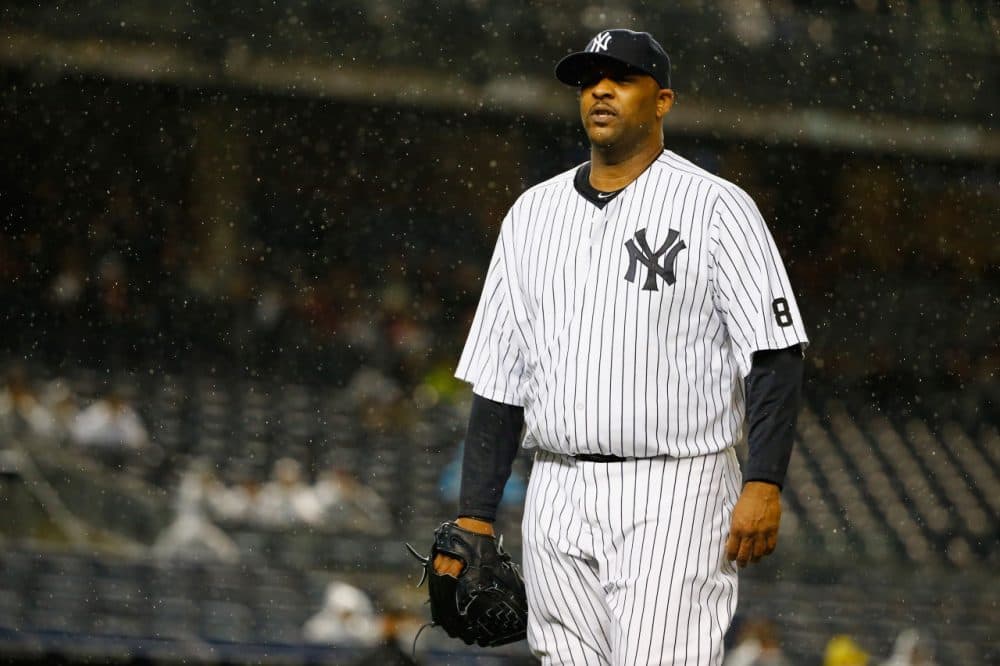Advertisement
'Knock 'Em Dead:' Sending Best Wishes To CC Sabathia
Resume
CC Sabathia's decision this week to leave the New York Yankees to seek treatment for alcohol addiction caught a lot of fans by surprise. Lane Filler, a member of the editorial board at Newsday, was one of those fans. Lane joined Bill Littlefield.
BL: You committed your first reaction to CC Sabathia’s decision to print this week. Please read the first paragraph of that column:
LF: "When I heard Monday that Yankees pitcher CC Sabathia was leaving the team to enter rehab for alcohol addiction, my immediate reaction was, 'Good grief, couldn't he just wait a month and then go?'"
BL: And in the next paragraph, you call that a "knee-jerk" response. How long did it take you to change your mind?
It's an extraordinary reality of alcoholism and recovery, and you'll hear people say it a lot, that what got them sober was a moment of clarity.
Lane Filler, member of Newsday's editorial board
LF: Oh, literally like 30 seconds. My thought process was, "I cannot believe I said that." And I went out into the larger office that I work in with several Yankees fans who know me well and who know that I'm an alcoholic, and I said, "You would not believe what just went through my mind."
It's embarrassing to suddenly care that much about your fandom for a team — and particularly a team that was clearly going nowhere. But to care more about that, just for a split second, than for the well-being of a human being, it doesn't make you feel great about yourself.
BL: Based on your own experience, Lane, why shouldn’t Sabathia have hung in for another day, at least — and more if the Yankees made it to the next level of the playoffs?
LF: It's an extraordinary reality of alcoholism and recovery, and you'll hear people say it a lot, that what got them sober was a moment of clarity. That in hundreds of days in a row, or thousands of days in a row, of waking up and saying, "I don't want to drink anymore. I don't want to use drugs anymore. I'm not going to do it today," this one day they think or say, "I don't want to do it anymore. I'm not going to do it anymore. And I'm going to tell someone, and I'm going to get help."
It's the moment of clarity that, for some reason, the disease takes a recess, the disease goes out of the room, and you are left to your own devices with the possibility that you might get help if you do it right then. And, if you don't, you may not have another moment of clarity like that ever.
BL: You characterize Sabathia’s courage in making the decision to ask for help when he did as “a gift.” And it sounds to me as if you think that decision must have been especially hard for a man who never wanted to come out of a ballgame.
LF: I don't know how you do that. I have to say that I'm in awe that he had the moment of clarity. He makes about $25 million a year. He has not been terribly successful the last couple of years. He has very close relationships with his coaches and with his players, his co-players. But to go to them on the eve of the playoffs, this thing that you play together for six months trying to get, and say, "I have to leave because I have to go get help now, and I couldn't go get help three weeks ago, and I can't go get help three weeks from now. I absolutely have to do it right now and desert you." It's just extraordinary to me. It's almost a hand-of-God thing that he found the strength to do that.
BL: I began our conversation by asking you to read the first paragraph of your column, so it’s only fair that I invite you now to read the last two paragraphs as well.
LF: "I hope Sabathia gets help that works for him, that makes him see he doesn't have to live that way and that he never has to drink again. I am, again, astonished at the courage he showed (and sickened by the level of pain it indicated) in being able to walk away at this moment to go try and get well.
I always loved him as a player, even when his pitches were getting hit hard. There was just so much toughness in him, with no excuse ever offered and no quarter ever shown.
Good luck, man. Knock 'em dead."
This segment aired on October 10, 2015.